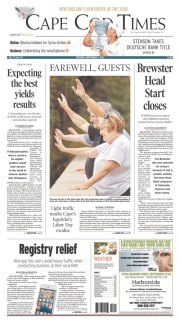 Rupert Murdoch is selling The Middleboro Gazette, the weekly that covers the Southeastern Massachusetts town where I grew up. I’m not sure Murdoch ever knew he owned it in the first place. It’s just something that was thrown in when his News Corporation bought The Wall Street Journal and Dow Jones in 2007.
Rupert Murdoch is selling The Middleboro Gazette, the weekly that covers the Southeastern Massachusetts town where I grew up. I’m not sure Murdoch ever knew he owned it in the first place. It’s just something that was thrown in when his News Corporation bought The Wall Street Journal and Dow Jones in 2007.
Earlier today, Dow Jones’ chain of local newspapers — formerly the Ottaway group — was acquired by an affiliate of Fortress Investments, the majority owner of GateHouse Media, which will manage the papers. I’m not sure why GateHouse itself isn’t buying the papers, but perhaps we’ll learn more in the days ahead. Jim Romenesko has more.
Dow Jones’ regional properties include some high-quality, well-known dailies such as The Standard-Times of New Bedford, the Cape Cod Times and the Portsmouth Herald of New Hampshire.
Two questions spring to mind:
- In general, the Ottaway papers have been spared some of the cuts that the financially struggling GateHouse chain has implemented. Will downsizing now commence? Or will the Ottaway papers’ odd status as non-GateHouse papers spare them?
- What happens to Boston Herald owner Pat Purcell, who’s been running the Ottaway papers for Murdoch since 2008? Will he content himself with running the Herald? Or will Murdoch come up with a new assignment for him?
The deal includes 33 publications, eight of them daily papers. Romenesko reports that financial terms were not disclosed. But given that The Boston Globe recently went for $70 million — not much more than the value of its land — I can’t imagine that a significant amount of money is changing hands.
Update: From Wednesday’s New York Times:
The details of the transaction were not released, but the money involved was evidently relatively small, because if it had been bigger (or, in financial terms, material to the company) News Corporation would have had to disclose more financial information.
Ouch.
Update II: Shows you what I know. Fortress paid $87 million for the Dow Jones papers, which may be a fraction of what they were worth a few years ago, but is more than I had imagined.
According to Tiffany Kary of Bloomberg BusinessWeek, an enormously complicated reorganization is now under way. The long-in-the-making bankruptcy of GateHouse Media is now a reality, and the company will be absorbed into a new company to be created by Fortress called New Media.
Update III: Jon Chesto of the Boston Business Journal has posted a must-read analysis of what’s going on. Talk about failing up. GateHouse is going bankrupt and will become part of something bigger. And it looks like GateHouse chief executive Mike Reed isn’t going anywhere.



 We already knew that the Boston Herald, having shut down its printing presses, was getting ready to leave its hulking South End plant. Now the other shoe has dropped, as Herald owner Pat Purcell
We already knew that the Boston Herald, having shut down its printing presses, was getting ready to leave its hulking South End plant. Now the other shoe has dropped, as Herald owner Pat Purcell 


